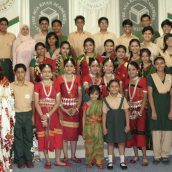Aga Khan Academy to be established in Bangladesh
Dhaka, Bangladesh, 20 May 2008 - His Highness the Aga Khan today laid a foundation stone for Bangladesh’s first Aga Khan Academy, emphasising the centrality of quality education in the Islamic tradition. “World and faith are inseparable in Islam. Faith and learning are also profoundly interconnected,” he said. Speaking at an official ceremony at the site of the future Academy in Dhaka’s Bashundhara District, attended by Bangladesh’s Education Advisor, The Honourable Dr. Hossain Zillur Rahman, the Aga Khan noted that Bangladesh was the first Muslim country to host an Aga Khan Academy. “Our traditional teachings remind us of our individual obligation to seek knowledge unto the ends of the earth -- and of our social obligation to honour and nurture the full potential of every human life,” he said. Dr Hossain Zillur Rahman praised the Aga Khan for his inspiring integrated vision for quality education which encompasses messages of opportunity, ambition, respect for cultural heritage and the importance of ethical behaviour - and thanked him for choosing Bangladesh as one of the fourteen countries that will host Aga Khan Academies.
The Aga Khan also stressed the need to regard national and cultural identity as key assets in education. “A fully homogenized world would be far less attractive and interesting. The roots we inherit from our history – linking us to a particular past – are a great source of strength and joy and inspiration,” he said, announcing that the Dhaka Academy will follow a dual-language curriculum in English and in Bangla.
However, the Aga Khan cautioned that the effort to preserve national identity should not compromise diversity and openness to the outside world. “In the process of nurturing a healthy sense of identity, we must resist the temptation to normatise any particular culture, to demonize “the other”, and to turn healthy diversity into dangerous discord.” The Aga Khan said the Academy undertaking was likely to be particularly successful in Bangladesh because of the country’s ability to combine a proud sense of independent national destiny with a generous spirit of international partnership. “In the final analysis, the Academies project will face an age-old challenge as it moves ahead - the challenge of balancing the universal and the particular - the global and the local - as influences in human life,” he said.
Addressing the same ceremony, the Director of the Academies Programme, Salim Bhatia, noted that it was the Bengali Nobel Prize winning poet, novelist and playwright Rabindranath Tagore, who coined the term “global village.” “The Aga Khan Academy in Dhaka will exist to develop leaders with a pluralistic sensibility, individuals who are proudly Bangladeshi, yet connected to the larger cosmopolitan global village described by Tagore over a century ago,” he said.
The Aga Khan Academies Programme will eventually encompass a network of 18 schools in a total of 14 countries scattered across Africa, Central and South Asia and the Middle East. The schools will use the International Baccalaureate curriculum and will admit students on the basis of their academic potential rather than their ability to pay. The first Aga Khan Academy, inaugurated in Mombasa Kenya in 2003, released its first class of graduates last June. Amongst the several high achievers, was Anoushka Rajan, awarded the International Leadership of Tomorrow scholarship to study Mechanical Engineering at the University of British Columbia, Canada. Other Academies around the world are currently in different stages of planning, design or construction.
For more information, please contact:
Semin Abdulla
Information Officer
Secrétariat de Son Altesse l'Aga Khan
E-mail : information@aiglemont.org
Notes:
The Aga Khan Development Network His Highness the Aga Khan is founder and Chairman of the Aga Khan Development Network (AKDN), a group of private, non-denominational development agencies working to empower communities and individuals to improve living conditions and opportunities, especially in sub-Saharan Africa, Central and South Asia, and the Middle East. The Network’s nine development agencies focus on social, cultural and economic development for all citizens, regardless of gender, origin or religion. The AKDN’s underlying ethic is compassion for the vulnerable in society. Its annual budget for social development is in excess of US$ 300 million. Golden Jubilee of His Highness the Aga Khan His Highness the Aga Khan completed his 50th year as the 49th hereditary Imam of the Shia Ismaili Muslims on 11th July 2007, succeeding his grandfather, Sir Sultan Mahomed Shah. The Aga Khan leads a community of 15 million Ismaili Muslims living in some 25 countries around the world and is a direct descendant of the Prophet Muhammad (peace be upon him and his family). In the Ismaili tradition, the Imam’s Jubilee celebrations offer occasions to launch new social, cultural and economic development projects. In keeping with the ethics of the faith, these projects aspire to improve the quality of life for the most vulnerable in society. During the Jubilee year, the Aga Khan will travel to a number of countries to meet with members of the Ismaili community, visit projects of the AKDN and announce the creation of new development institutions and projects and the significant expansion of existing ones.





